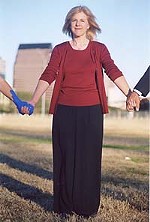Articulations
The UT symposium "From Text to Performance: Law and Other Performing Arts" proved to be a stimulating blend of scholarly thought, intellectual inquiry, thoughtful performance, amicable conversation, fiery debate, and amusing anecdotes.
By Robert Faires, Fri., March 15, 2002
From Symposium to Review
If the few hours I spent seeing them paired together were any indication, law and the performing arts deserve to be ranked right there with chocolate and peanut butter: two great tastes that taste great together. The 10-day symposium "From Text to Performance: Law and Other Performing Arts," sponsored by the UT Law School and UT College of Fine Arts, with the cooperation of the Harry Ransom Humanities Research Center, ended up a stimulating blend of scholarly thought, intellectual inquiry, thoughtful performance, amicable conversation, fiery debate, and amusing anecdotes. Musicologists and legal scholars mixed it up over rights of interpretation, choreographers told tales about legends of dance, English professors shared insights into Shakespearean text, reporters and justices offered sneak peeks behind the judges' robes, and everyone ate well.
Among the events attended by me: a discussion of law in the plays of Shakespeare, i.e., the guy who gave us the line "The first thing we do, let's kill all the lawyers," in which it was argued that while they were interesting guys to hang out with, guys you'd like to have a beer with, Richard II and Hamlet were not really king material (for that you want efficient dullards like Claudius and Bolingbroke); and a panel on reviewing legal and dramatic performance, moderated smoothly by the Austin American-Statesman's Michael Barnes, in which the New York Times' Supreme Court reporter Linda Greenhouse revisited her critique of the Court's less-than-stellar call on Bush v. Gore.
Friday provided one of the symposium's most intriguing programs: an investigation into The Merchant of Venice, with the familiar trial scene -- you know, "the quality of mercy is not strained" -- interpreted five different ways by five different groups. Three of them stuck with Shakespeare's text, which allowed us to see a "philo-Semitic" Shylock (actor-director Charles Siegel as a sympathetic figure, a Jew standing up for himself against bullying Christians, in the version by the Law & Lit Players), a morally mixed Shylock (Joe Acock, all indignant, and self-righteous, but not all that different from the Christians he is pitted against in the scene by Shakespeare at Winedale), and a Shylock played as a traditional villain (actor Harvey Guion employing a thick accent, broad gestures, and an implacable will in the scene by the Zachary Scott Theatre Center). The scene from the UT Department of Theatre & Dance, directed by symposium guest Jonathan Miller, utilized the trial scene from the contemporary play Shylock, in which playwright Arnold Wesker (also a symposium guest) reimagines the character as a cheery, relentlessly curious fellow and loyal friend to Antonio who is pursuing the "pound of flesh" only out of his abiding respect for the law. The Rude Mechanicals dispensed with Shylock altogether; Kirk Lynn's original scene distilled the scene down to a handful of lines for a very contemporary Portia (Sarah Richardson, hilariously breezing through "the quality of mercy" lines with the attitude of, "C'mon, this is a no-brainer") then gave most of the time over to an incongruously present Ludwig Wittgenstein (Guion again, here bright-eyed and enthusiastic), who proceeded to use a drawing of a cartoon animal -- turned one way it looked like a rabbit, turned another like a duck -- as a visual aid in a lesson on perception. And it proved quite illuminating where the original trial scene's discussion of "justice" was concerned.
The experience provided several unexpected delights -- Arnold Wesker shaking the hand of every student who performed in the scene from his play; Jonathan Miller extemporizing on the concepts of kin and kindness, the gentle and the Gentile, as deep currents running through The Merchant of Venice; New York Times music critic Anthony Tomassini tickling the ivories in order to demonstrate how some kinds of playing are just plain wrong -- but the chief delights were just where they were expected: in the cogent analyses and wisdom offered by the symposium's speakers and contributors. It may not be standard to applaud a legal symposium, but this one rates it. Encore!








